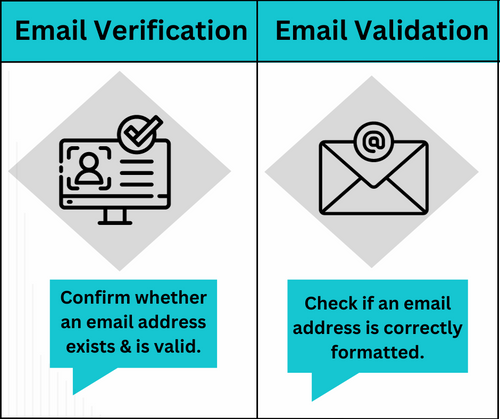In the digital age, where communication is largely carried out through emails, maintaining a pristine email list is paramount for businesses and individuals alike. This is where email verification and email validation come into play. In this comprehensive guide, we will explore the critical differences, benefits, and best practices of email verification and email validation. Whether you're a marketer, business owner, or simply someone who values accurate communication, understanding these processes is vital for maintaining data quality and ensuring your emails reach their intended recipients.
The Essence of Email Verification and Validation
Email verification and validation are distinct yet interrelated processes that serve a common purpose: ensuring that email addresses in your database are accurate, functional, and deliverable.
Email Verification: This process focuses on checking the validity and deliverability of an email address. It typically involves sending a verification email to the address and confirming its existence and responsiveness.
Email Validation: While email validation also verifies email address format and syntax, it may not involve sending an actual email. Instead, it focuses on detecting typos, syntax errors, and common issues that could render an email address undeliverable.
Why Email Verification and Validation Matter
Understanding the significance of these processes is crucial:
Data Accuracy: Validating and verifying email addresses ensure that the data you collect is precise, reducing bounce rates and inaccuracies in your communications.
Deliverability: Clean email lists lead to improved email deliverability, ensuring that your messages reach the right inbox rather than being filtered as spam.
Cost Efficiency: By removing invalid or undeliverable email addresses, you save on email marketing costs, as many services charge based on the number of emails sent.
Reputation Management: Sending emails to invalid or unresponsive addresses can harm your sender reputation and impact your ability to reach inboxes.
Email Verification: How It Works
Email verification typically involves the following steps:
Syntax Check: Verify that the email address follows the correct format (e.g., [email protected]).
Domain Check: Confirm that the domain (e.g., domain.com) is valid and responsive.
SMTP Check: Attempt to establish an SMTP connection to the recipient's mail server to verify its existence and responsiveness.
Catch-All Domain Check: Determine if the domain accepts all emails (catch-all) or only specific ones.
Email Validation: How It Differs
While email validation shares some similarities with verification, it primarily focuses on:
Syntax Validation: Checking for common syntax errors and typos in email addresses.
Domain Validation: Verifying the format and existence of the domain.
Disposable Email Check: Identifying disposable or temporary email addresses.
Role-Based Email Detection: Flagging email addresses associated with roles (e.g., [email protected]) rather than individual users.
Benefits of Email Verification and Validation Services
Investing in professional email verification and validation services offers several advantages:
Accuracy: These services employ advanced algorithms and databases to ensure precise results.
Time and Cost Efficiency: Manual verification/validation is time-consuming; automated services provide rapid and cost-effective solutions.
Bulk Processing: Easily verify/validate large email lists in one go, saving time and effort.
Compliance: Ensure compliance with email marketing regulations by maintaining clean and opt-in lists.
Choosing the Right Email Verification or Validation Service
Selecting the best service for your needs requires careful consideration. Factors to assess include:
Accuracy: Look for services with high accuracy rates and updated databases.
Speed: Consider the processing speed, especially for bulk verifications.
Integration: Ensure the service can be integrated into your email marketing platform or CRM.
Cost: Evaluate pricing plans based on your budget and usage.
Common Questions About Email Verification and Validation
Is email verification/validation necessary for small businesses?
Yes, it's essential for businesses of all sizes to maintain data accuracy, deliverability, and compliance.
How often should I verify/validate my email list?
Regular verification/validation is essential, especially before major email campaigns and periodically throughout the year.
Can I perform email verification/validation manually?
While it's possible, automated services are more accurate, efficient, and cost-effective.
Do email verification/validation services store my data?
Reputable services prioritize data privacy and security, often deleting data after processing.
In conclusion, email verification and validation are indispensable processes for anyone who relies on email communication. Whether you're a marketer, business owner, or individual, the accuracy and deliverability of your messages depend on the quality of your email list. By understanding the differences between these processes, the benefits they offer, and how to choose the right service, you can ensure your emails consistently reach their intended recipients, leading to more effective and efficient communication.



